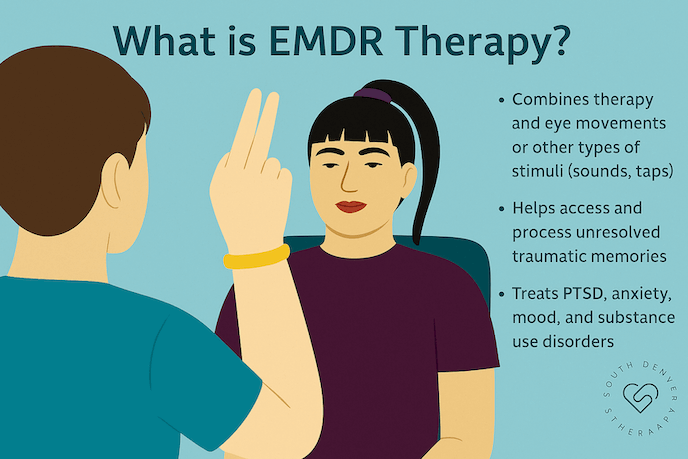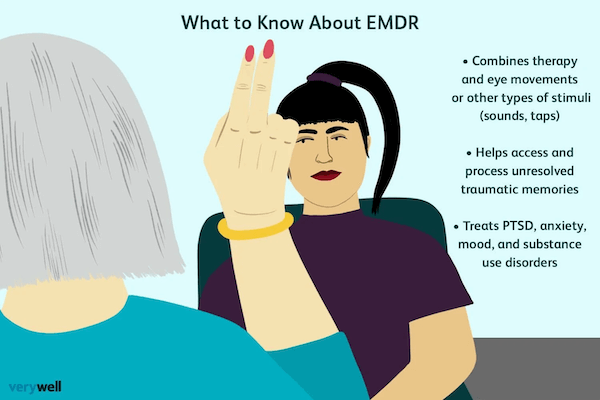
EMDR Therapy Near Greenwood Village - Effective Trauma Treatment
With our EMDR therapy, you can heal from past trauma, reduce anxiety, and reclaim your emotional well-being for a brighter future.
What Is EMDR Therapy?
EMDR (Eye Movement Desensitization and Reprocessing) therapy is an evidence-based approach designed to help people recover from trauma, anxiety, PTSD, and other distressing life experiences. Developed in the late 1980s by Francine Shapiro, it works by using guided eye movements or other forms of bilateral stimulation (like sounds, taps, or lateral eye movements) while you recall upsetting memories. This process, known as desensitization and reprocessing emdr, is the core mechanism of the therapy. It helps your brain reprocess those memories so they feel less intense, overwhelming, or stuck. EMDR doesn’t require talking in detail about the trauma, making it a powerful option for those who find traditional talk therapy difficult. EMDR focuses on changing emotional and cognitive responses to distressing experiences, distressing issues, and disturbing events or disturbing experiences, rather than requiring detailed discussion.
At South Denver Therapy, we offer EMDR therapy near Greenwood Village for individuals seeking real healing from the effects of trauma. Whether you’re dealing with childhood wounds, grief, panic attacks, or recent life events, EMDR can help you move forward with greater emotional resilience. Our trained EMDR therapists provide compassionate, personalized care to help you feel safe, supported, and empowered through every step of your healing journey. During sessions, clients may also notice and process body sensations as part of the therapeutic experience.
How EMDR Therapy Works
EMDR therapy is a structured form of psychotherapy designed to help people heal from the symptoms and emotional distress caused by traumatic memories and other distressing life experiences. The process unfolds over eight distinct phases, beginning with an initial history-taking session where you and your therapist identify the specific memories or issues you want to address.
After this, the preparation phase helps you build trust and learn coping strategies, ensuring you feel safe and supported throughout your healing journey. The core of EMDR involves targeting specific memories and using bilateral stimulation—such as guided eye movements, tapping, or sounds—to activate both sides of the brain. This unique approach helps your brain reprocess and integrate traumatic memories, reducing their emotional intensity and allowing your natural healing process to take over.
Throughout each session, your therapist will guide you in focusing on particular memories, thoughts, or sensations, while using bilateral stimulation to facilitate the brain’s information processing. Over time, this process helps you form new, healthier associations with past experiences, leading to a reduction in symptoms and a greater sense of mental health and well-being. EMDR empowers you to heal, not just by talking about your experiences, but by actually transforming how your brain stores and responds to them.
Conditions Treated with EMDR
EMDR is widely recognized as an effective treatment for post traumatic stress disorder (PTSD), but its benefits extend far beyond trauma alone. EMDR therapists use this approach to help clients struggling with a variety of mental health conditions, including anxiety, depression, obsessive compulsive disorders, panic disorders, dissociative disorders, and even chronic pain.
Whether you’re dealing with the aftermath of traumatic events, ongoing distressing life experiences, or specific memories that continue to impact your daily life, EMDR can help you break free from the cycle of negative symptoms and behaviors. Many clients find that movement desensitization and reprocessing allows them to address the root causes of their distress, rather than just managing surface-level symptoms.
EMDR is also effective for those with complex trauma, attachment issues, or chronic emotional pain. By working with a skilled EMDR therapist, you can process and reframe the memories and beliefs that keep you stuck, paving the way for genuine healing and recovery. This evidence-based treatment offers hope and relief for many clients who have not found success with other therapies, making it a powerful tool for anyone seeking to reclaim their mental health and well-being.
Desensitization and Reprocessing in EMDR
At the heart of EMDR therapy are the processes of desensitization and reprocessing, which work together to transform how you experience and respond to traumatic memories. During the desensitization phase, your therapist helps you gradually reduce the emotional distress linked to painful memories, using bilateral stimulation such as eye movements or tapping. This technique activates your brain’s natural healing process, making it easier to face and process difficult experiences.
The reprocessing phase goes a step further, allowing you to integrate these memories into your life story in a way that no longer causes overwhelming pain or negative beliefs. As you move through these phases, you’ll notice that the memories lose their power, and you begin to develop more positive beliefs and adaptive behaviors.
By facilitating the processing and integration of traumatic memories, EMDR helps clients move beyond the past and embrace a future defined by resilience and emotional well-being. This approach not only reduces distress but also empowers you to adopt healthier perspectives and behaviors, supporting lasting healing and growth.
How Effective Is EMDR Therapy?
EMDR therapy has emerged as one of the most effective approaches for treating trauma and post-traumatic stress disorder (PTSD). By using bilateral stimulation techniques (such as guided eye movements or tapping), EMDR helps you reprocess distressing memories so they lose their intense emotional charge. In fact, dozens of clinical trials have shown that EMDR can lead to faster and more noticeable improvements than traditional talk therapy. Its success in addressing not only trauma but also related issues like anxiety and depression underscores its versatility as a healing tool. Because of its proven results, EMDR is endorsed by leading health organizations – from the American Psychological Association, the American Psychiatric Association, to the World Health Organization – as an effective, evidence-based treatment for trauma recovery. Additionally, the U.S. Department of Veterans Affairs and Department of Defense consider EMDR a best practice for treating PTSD. In short, EMDR offers hope and rapid relief for those navigating the complex challenges of PTSD and other trauma-related conditions.
Hi, I’m Carissa! Let’s work together to heal, and transform through EMDR Therapy!
EMDR (Eye Movement Desensitization and Reprocessing) therapy is a powerful, evidence-based approach to addressing trauma and emotional distress. As a licensed professional, I am dedicated to guiding you through this transformative process – helping you resolve past traumas and improve your overall well-being. In our sessions, we will work together to reprocess painful memories, reduce emotional distress, and build healthier coping mechanisms. Let’s embark on this journey to healing and recovery, enabling you to live a more balanced and fulfilling life.
How EMDR Therapy Can Help You
Trauma Resolution
EMDR therapy helps you process and release the emotional weight of traumatic and painful events, allowing you to move forward with your life instead of feeling stuck in the past. Emotional wounds, much like physical wounds, can heal once the block preventing recovery is removed, and EMDR facilitates this healing process by helping you reframe emotional responses.
Symptom Reduction
Many people experience relief from distressing symptoms. EMDR can significantly reduce symptoms associated with anxiety, depression, and PTSD by addressing their root causes.
Rapid Improvement
EMDR often leads to faster and more noticeable improvements compared to traditional talk therapy, making it a valuable choice if you’re seeking efficient solutions to your challenges. As you move through therapy, tracking your progress is an important part of experiencing healing and recognizing positive changes.
Memory Reconsolidation
Through EMDR, you can reprocess disturbing memories and gradually reduce their emotional intensity. Over time, those memories become less triggering and more manageable, leading to genuine emotional healing. This is because traumatic memories are processed differently than normal memories, and when this processing is disrupted, it can lead to negative symptoms, emotions, and behaviors. EMDR helps restore proper processing, resulting in changes not only in emotions and thoughts but also in behavior as part of emotional health. During EMDR sessions, clients also work to develop or reinforce a positive belief related to the targeted memory, supporting the healing process.
Improved Emotional Regulation
EMDR equips you with valuable tools to manage your emotions. You’ll learn to respond more calmly to life’s stressors, promoting greater emotional stability and resilience. EMDR can also help address issues like low self esteem by transforming negative self-perceptions.
Better Self-Understanding
The EMDR process can foster deeper self-awareness and insight. By working through trauma, you gain a greater understanding of yourself – your reactions, beliefs, and strengths – which fuels personal growth and empowerment.

Why Choose Us For EMDR Therapy
Expertise and Experience
Our therapists bring years of specialized experience in trauma and EMDR therapy, ensuring you receive the highest level of care. Finding the right therapist is essential for building a trusting relationship and achieving lasting change, and our team is dedicated to providing a caring, knowledgeable, and empathetic approach. Many of our EMDR-trained clinicians focus on specialized areas such as trauma and PTSD, tailoring their expertise to meet your unique needs.
Non-judgmental and Compassionate
We offer a completely judgment-free, compassionate space where you can share openly without fear. You will be heard, validated, and supported at every step of your healing journey.
Cultural Sensitivity
Everyone’s background and experiences are unique. We are committed to cultural sensitivity and respect for your individuality, tailoring our approach to fit you and your personal story.
Free Consultation
Not sure if EMDR is right for you? We offer a free 15-minute consultation to discuss your needs and expectations. This gives you a chance to ask questions and make sure we’re the right fit before you begin.
Confidentiality & Privacy
Your privacy is our priority. We maintain strict confidentiality, so you can feel safe discussing personal matters. What you share with us stays with us – your information is always protected.
LGBTQ-Friendly
Our center is a safe and welcoming place for everyone, regardless of sexual orientation or gender identity. We’re proud to be an LGBTQ-friendly practice that embraces everyone with open arms and understanding.
What Our Clients Say
Top Rated EMDR Therapy Near Greenwood Village!
We’re located just a short drive from Greenwood Village, offering you a safe and friendly place to pursue healing. Our clinic provides easy access, with proximity to major highways, public transportation, and ample parking, making it simple for you to reach us. We understand how important it is to have therapy close by and accessible when you need it. At our convenient Castle Rock location, you’ll receive personalized EMDR treatment focused on your needs and goals for recovery, including therapy approaches tailored for young adults during important life transitions.
If Castle Rock feels too far, we also offer online EMDR therapy sessions that are just as effective as in-person appointments. You can get the same expert support and healing from the comfort of your home.
Whether you’re dealing with trauma, PTSD symptoms, anxiety, or other challenges, our caring therapists are here for you. You don’t have to carry the burden of your past alone – help is nearby, and we’re dedicated to guiding you every step of the way toward relief and recovery.

Frequently Asked Questions
-
The number of EMDR therapy sessions required for optimal results can vary from person to person. During your initial consultation, our experienced therapists work with you to assess your unique needs and develop a personalized treatment plan. At the end of each session, your therapist will discuss what to expect in the next session, ensuring you understand how the process continues and what the upcoming steps will be.
-
We understand that flexibility is crucial for our clients, so we offer in-person and online EMDR therapy sessions. You can choose the option that best suits your preferences and needs.
Whether you prefer the convenience of virtual sessions or the comfort of face-to-face interactions, our therapists are here to accommodate your choice and provide the support you require.
-
We are an out-of-network provider and do not bill insurance directly. This allows us to offer personalized, client-centered care without restrictions from insurance companies, such as requiring a diagnosis or limiting session types. However, we’ve partnered with Mentaya, a service that helps you check your out-of-network benefits and may even file claims for you. You can use the tool on our FAQs page to see if you’re eligible for reimbursement.
Our Services
Trauma Therapy
Our trauma therapy offers a safe space to heal from past experiences. Together, we navigate recovery at your pace, fostering resilience and restoring hope.
Depression Therapy
Feeling weighed down? Our depression therapy supports you through the lows. We work on coping strategies and uncovering the light within step by step.
Anxiety Therapy
Don’t let anxiety rule your life. Our therapy equips you with practical techniques to manage stress, regain calmness, and live with renewed confidence.





















